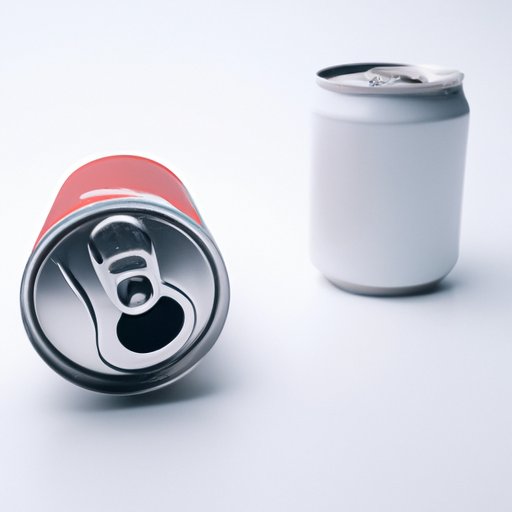
I. Introduction
Caffeine is a commonly consumed stimulant found in a variety of foods and beverages, including coffee, tea, energy drinks, and soda. Diet Coke, a popular soda choice, is known for its zero-calorie and sugar-free formula. But what about its caffeine content? In this article, we will explore how much caffeine is in Diet Coke, whether it’s safe to drink, and how it affects the body and mind.
II. The Truth about Caffeine in Diet Coke: Is It Safe to Drink?
According to Coca-Cola’s website, there is 46mg of caffeine in a 12-ounce can of Diet Coke. This amount is significantly less than the amount of caffeine in a similarly sized cup of coffee, which can range from 70-140mg. Generally speaking, most health experts consider caffeine intake of up to 400mg per day safe for healthy adults.
However, it is important to note that caffeine affects everyone differently, and some people may be more sensitive to its effects. Caffeine can cause negative side effects such as anxiety, jitters, and insomnia, and it can also exacerbate existing health conditions such as acid reflux, high blood pressure, and heart disease. Based on this, it is best to monitor individual caffeine consumption and listen to the body’s perceived caffeine tolerance.
III. How Much Caffeine Is Too Much? A Look at Diet Coke’s Caffeine Content
The recommended daily intake of caffeine varies based on age, sex, and overall health. The American FDA recommends that individuals should consume no more than 400mg of caffeine per day, which is equivalent to approximately four cups of coffee or ten 12-ounce cans of Diet Coke a day.
However, consuming too much caffeine can lead to adverse effects such as jitters, sleep disturbances, stomach issues, and headaches. It’s important to keep in mind that excessive caffeine intake can also lead to caffeine addiction, which produces physical withdrawal symptoms such as irritability and fatigue when one tries to cut back on caffeine consumption.
IV. Caffeine in Diet Coke: Everything You Need to Know
A 12-ounce can of Diet Coke contains 46mg of caffeine, while a 16-ounce can contains 61mg. Caffeine is a natural stimulant found in the seeds, leaves, and fruit of some plants. It is also added to some foods and beverages, such as cola drinks and energy drinks, to enhance flavor and create a stimulating effect.
Caffeine can also cause the release of dopamine, a neurotransmitter that plays a role in mood regulation and pleasure sensations. This production of dopamine may be why people become energetically addicted to caffeine.
For healthy adults, moderate caffeine intake of up to 400mg per day is generally considered to be safe. Still, it is crucial to monitor one’s individual caffeine tolerance, as sensitivity to caffeine can vary dramatically from person to person.
V. Diet Coke vs. Regular Coke: Which Contains More Caffeine?
One common question people have is whether Diet Coke or regular Coke contains more caffeine. Both versions of cola drinks contain similar caffeine levels, with a standard 12-ounce can of Coca-Cola containing 34mg of caffeine.
Thus, those who are looking to cut back on sugar and calories will not put themselves at an increased risk for caffeine intake by choosing a diet soda alternative.
VI. The Pros and Cons of Caffeine in Diet Coke
While caffeine provides several benefits, including increased energy, alertness, and focus, it can also come with drawbacks. For example, excessive caffeine consumption can cause jitters, anxiety, and insomnia, as well as exacerbate gastric issues and increase the risk of heart attack or stroke.
Moreover, despite the fact that Diet Coke’s caffeine content is low, it is still enough to produce a stimulating effect that may lead to caffeine addiction over time.
VII. How Caffeine in Diet Coke Affects Your Body and Mind
Caffeine has several short-term effects on the body and mind, including increased alertness and concentration, faster heart rate, and elevated blood pressure. Still, some people may experience jitters, anxiety, and lessened quality of sleep after consuming caffeine—side effects that may adversely affect one’s overall health.
Research has shown that moderate caffeine intake can benefit physical performance and even reduce the risk of developing certain diseases, such as Parkinson’s disease, Alzheimer’s disease, and some types of cancer.
VIII. Alternatives to Caffeine in Diet Coke: What to Drink Instead
If you’re looking to cut back on caffeine intake, consider the following beverage alternatives:
- Herbal tea – Herbal tea contains no caffeine and is a healthy option to replace caffeinated beverages such as Diet Coke.
- Decaf coffee – Decaf coffee is similar in taste and function to coffee, but with lower caffeine levels. A typical cup of decaf coffee contains roughly 2-5mg of caffeine.
- Sparkling water – Seltzer water with a slice of lemon or lime can provide a refreshing alternative to sugary beverages while maintaining hydration.
- Plant-based milks – Unsweetened plant-based milks, including almond, rice, and soy milk, are low in calories and offer a healthy way to stay hydrated.
IX. Conclusion
Caffeine is a stimulant found in many foods and beverages, including Diet Coke. Consumption of caffeine in moderation is generally considered to be safe and can enhance performance and mood. However, excess caffeine intake can lead to adverse side effects and affect one’s health negatively.
If you’re looking to decrease your caffeine intake, consider switching to alternative beverages options such as herbal teas, plant-based milks, sparkling water, or other low-caffeine options.
It is essential to listen to your body and pay attention to its reaction to caffeine consumption. Remember that moderation in all things is key.




